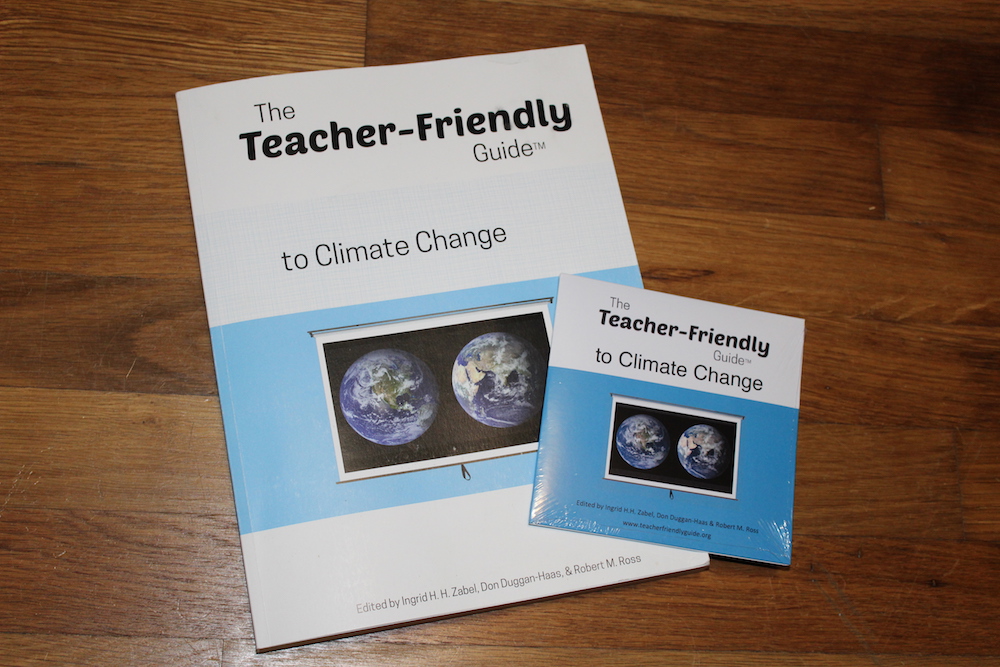On a Monday morning at the end of October, Rob Ross asked a group of earth scientists and educators a question: How many of them had received copies of the Heartland Institute book Why Scientists Disagree About Global Warming?
You could feel an immediate sense of frustration in the air. Roughly half of them raised their hands. The Heartland Institute is a Chicago-based think tank that rejects the scientific consensus that humans are changing the climate and has received funding from the conservative billionaire Koch brothers and fossil fuel industry.
In March, it mailed, unsolicited, a 135-page book and accompanying DVD to tens of thousands of science teachers at public high schools across the U.S., with plans to keep that up until the report was in the hands of every last one.
While it received swift backlash — including from Democratic senators, Heartland’s most recent effort (though not its first) to spread climate science denial in public schools had a somewhat fortuitous timing. Ross and his colleagues at the Paleontological Research Institution were putting the finishing touches on their own book for science educators, The Teacher-Friendly Guide to Climate Change.
We “had it mostly done when we learned about the Heartland Institute’s project to distribute misinformation” to teachers across the country, Ross told DeSmog. He recalls finding out about Heartland’s teacher mailing either through Facebook or the news. It caused an immediate stir among the community of earth science educators.
“At first, we were, of course, incredibly alarmed but our second thought was, ‘Well, OK, we have a product to counter it,’” said Ross, who was one of The Teacher-Friendly Guide’s editors.
“This gave us a really strong motivation to get the book in the hands of as many teachers as possible across the country.”
Don Duggan-Haas, who also contributed to the guide, says their team felt compelled to respond more directly to Heartland’s misinformation but in a way that wouldn’t delay their own publishing date.
The Teacher-Friendly Guide already had 11 chapters covering everything from the evidence and causes of climate change to the obstacles in addressing and reasons for teaching it. Adding a final chapter, written by Alexandra Moore, in the form of frequently asked questions (FAQ) seemed like the best approach.
Taking on Heartland Institute Myths
While they don’t explicitly mention the Heartland teacher mailing in the FAQ, Duggan-Haas pointed out, “The first question of the FAQ chapter is ‘Is there a consensus among climate scientists that global warming is occurring and that humans are the cause?’”
The title of the Heartland book, of course, was Why Scientists Disagree About Global Warming.
“That’s a pretty direct response to the theme of their publication,” he said.
In keeping with best practices for science communication, Duggan-Haas said they didn’t want to trigger the “backfire effect,” a phenomenon that may occur when trying to correct misinformation.
“We’re trying to avoid restating the myth in a way that would reinforce it,” he said.
Ross agreed: “We did not dwell on the Heartland Institute, even in the FAQ, but we did try to make sure we addressed some of the most important points that the Heartland Institute was making in their propaganda.”
In its FAQ, the Paleontological Research Institution’s teacher guide answers 18 questions touching on common climate science denier points, including why we can trust the proven reliability of computer climate models and why humans, rather than natural variation or the sun, are the most likely explanation for observed global warming.
One of the questions, “Are people who are arguing that global warming is happening being alarmists?” is a likely reference to the derogatory term, “alarmist,” frequently used by the Heartland Institute and other climate denier organizations.
Heartland and NIPCC Called Out
While The Teacher-Friendly Guide doesn’t mention the Heartland Institute’s propaganda sent to teachers, it does call out the science-denying think tank by name. Question 16 in the FAQ reads like this: “Climate websites refer to both the IPCC and, more recently, the NIPCC. What is the difference between these two organizations?”
The former, the Intergovernmental Panel on Climate Change (IPCC), consists of thousands of climate scientists and was created by the United Nations. It has reviewed more than 9,000 scientific publications and released five reports on the state of climate change science, written by 500 lead authors and checked by 2,000 outside scientists.
But the NIPCC, the “Nongovernmental International Panel on Climate Change,” is a product of the Heartland Institute and regularly directs criticisms at the IPCC reports.
The Teacher-Friendly Guide goes on to describe Heartland and the NIPCC:
“The ‘Nongovernmental International Panel on Climate Change’ is sponsored by the Heartland Institute, a U.S.-based conservative think tank best known for fighting government regulation of the tobacco and fossil fuel industries. Heartland has campaigned to downplay threats posed by second-hand smoke, acid rain, and ozone depletion, as well as against the Endangered Species Act. The Heartland NIPCC also issues periodic reports, timed to coincide with the release of IPCC assessment reports and formatted to look like them. NIPCC reports are authored by fewer than 50 individuals and the most recent report cites only 72 papers, mostly written by the NIPCC authors.”
The National Center for Science Education handily debunks the NIPCC — and so has DeSmog.
Correcting the Record With More Mail for Teachers
Published in May, The Teacher-Friendly Guide to Climate Change has its work cut out for it. Ross says their plan is “to send a guide to every high school in the country with CDs for every teacher in the high school.”
And they’re crowdfunding to raise more money, on top of their original National Science Foundation grant, in order to pull that off.
But Heartland reports that it has delivered its publication to “more than 300,000 K-12 and college-level teachers all across America.”
And while Duggan-Haas says his earth science teacher colleagues did not fall for it — and even discussed plans for using it in lessons on detecting biased publications — he acknowledged that American science teachers, generally and unsurprisingly, reflect the knowledge and attitudes of the broader American public on climate change.
Still, six months after the first release of The Teacher-Friendly Guide to Climate Change, it seems to be in high demand: the paperback version ($25 each) has already run out but will be available again in early December. But anyone can access a free PDF of The Teacher Friendly Guide online right now.
Main image: The Teacher-Friendly Guide to Climate Change, in book and CD format. Credit: Ashley Braun, DeSmog
Subscribe to our newsletter
Stay up to date with DeSmog news and alerts







